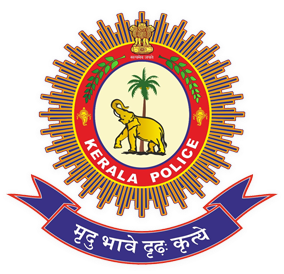
The Indian Police Service is a civil service under the All India Services. It replaced the Indian Imperial Police in 1948, a year after India became independent from the British Empire.

Law enforcement in India is imperative to keep justice and order in the nation. Indian law is enforced by a number of agencies. Unlike many federal nations, the constitution of India delegates the maintenance of law and order primarily to the states and territories.
Deputy Superintendent of Police alias Assistant Commissioner of Police (DSP) alias (ACP) is a rank used by several police forces in the Commonwealth and formerly in the British Empire. The rank is usually above assistant superintendent and below superintendent.
The All India Services (AIS) comprises three Civil Services of India common to the centre and state governments, which includes the Indian Administrative Service (IAS), the Indian Police Service (IPS), and the Indian Forest Service (IFS). Civil servants recruited through All India Services by the central government are assigned to different state government cadres. Some civil servants may, later in their career, also serve the centre on deputation. Officers of these three services comply to the All India Services Rules relating to pay, conduct, leave, various allowances etc.
The Indian Forest Service (IFS) is the premier forest service of India. It was constituted in the year 1966 under the All India Services Act, 1951.

The West Bengal Police is one of the two police forces of the Indian state of West Bengal. The other being the Kolkata Police, which has a separate jurisdiction across Kolkata.
The Superintendent of Police (SP) is a rank in Indian police forces held by an officer who typically heads a rural police district. Other officers of the same rank may lead specialised wings or units. In cities under commissionerate system, an SP may serve as the Deputy Commissioner of Police (DCP) under the Commissioner of Police. The SP reports directly to the district magistrate (collector), the administrative head of a revenue district, who has general control and direction over police administration. Additionally, an SP sends monthly reports to the Director General of Police (DGP) via the Inspector General of Police (IGP) and the Deputy Inspector General of Police (DIG).

Gazetted officers include all the Indian Police Service officers which are Group A officers of the cadre and all State Police Services officers of and above the rank of Deputy Superintendent of Police. All are arranged in a hierarchical order.

The Uttar Pradesh Police, is the primary law enforcement agency within the Uttar Pradesh state of India. Established in 1863 as the Office of the Inspector General of Police, United Provinces under the Police Act, 1861. It is headed by Director General of Police (DGP).
Additional Superintendent of Police or Additional Deputy Commissioner of Police, is a rank in Indian police forces. The officer holding this rank can be from the Indian Police Service (IPS) or from respective state police services like the Provincial Police Service (PPS), West Bengal Police Service (W.B.P.S.), Odisha Police Service (O.P.S.), Maharashtra Police Service (M.P.S.), Kerala Police Service (K.P.S.), etc.

The Andhra Pradesh Police is the law enforcement agency of the state of Andhra Pradesh, India. Public order and police being a state subject in India, the police force is headed by the Director general of police, Harish Kumar Gupta.

The Mizoram Police Force is the law enforcing agency of the state of Mizoram, India.

The Manipur Police is the law enforcement agency for the state of Manipur in India.

The Telangana Police, officially known as the, Telangana State Police Department is the law enforcement agency for the state of Telangana in India. It has jurisdiction concurrent with the 33 revenue districts of the state. The police force was created from the remnants of the Andhra Pradesh Police after Telangana state was formed. It is headed by the Director general of police, Ravi Gupta, and headquartered in Hyderabad, Telangana.

The Kerala Police is the law enforcement agency for the Indian state of Kerala. Kerala Police has its headquarters in Thiruvananthapuram, the state capital. The motto of the force is "Mridhu Bhave Dhrida Kruthye" which means "Soft in Temperament, Firm in Action" in Sanskrit. It operates under the Department of Home Affairs, Government of Kerala. The force is headed by the State Police Chief, and the incumbent chief is Shaikh Darvesh Sahib, IPS.
Provincial Police Service, often abbreviated to as PPS, is the state civil service for policing of Uttar Pradesh Police comprising Group A and Group B posts. It is also the feeder service for Indian Police Service in the state.
In India, the police forces of the states and union territories are responsible for law enforcement in the states and union territories. Police and Public Order are State subjects under the Seventh Schedule to the Constitution of India.

Commissioners of Police in India are IPS officers who head the police force in a police commissionerate. A police commissionerate can combine several adjoining districts under it. A Police Commissioner may or may not hold certain powers of the executive magistrate, contrary to the Superintendent of Police (SP) or Senior SP (SSP) in charge of a police district who depends on the district magistrate to issue orders. Commissioner of Police (CP) is a post that can be held by an IPS officer of the rank Deputy Inspector General of Police (DIG) and above, depending upon the sanction provided by the respective state government.

The Lucknow Police Commissionerate is the primary law enforcement agency for the city of Lucknow, the capital of Uttar Pradesh, India. It is a police unit of Uttar Pradesh Police and has the primary responsibilities of law enforcement and investigation in Lucknow district.

















